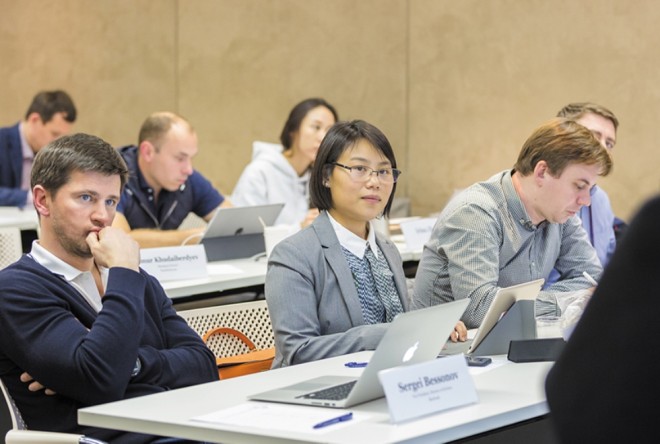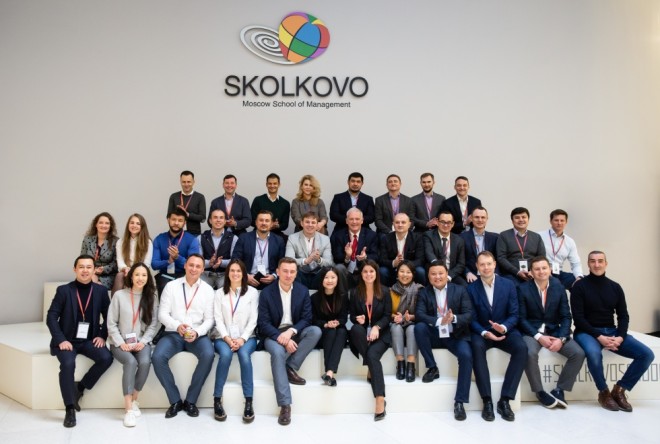For biomedical entrepreneur Dr Bonny Chow, the decision to join an Executive MBA (EMBA) program was motivated by her passion to explore new ideas and enhance her business knowledge and strategic thinking while building up a network of experienced international business executives as contacts and mentors.
With plans to expand her business internationally, including to countries in the Belt and Road Initiative (BRI), Chow says she needed to gain the knowledge of how the international mechanics of business works, particularly negotiation and communication. She was also looking to gain exposure to a broader set of innovation and leadership skills to complement the scientific and medical skills she had already developed.
“I wasn't looking to simply complete an EMBA program, but was also keen to see what I could get out of it,” says Chow, who specializes in stem cell applications as well as operating wellness centers and clinics in Hong Kong, Macau and Guangzhou.
Jointly offered by the HKUST Business School and the Moscow School of Management SKOLKOVO, with its focus on Eurasia, including the China-led BRI, the first-of-its-kind EMBA program has ticked all the boxes, Chow says. “The focus on leadership, innovation and the fourth industrial revolution seemed custom-made for me,” says Chow, who explains she was looking for a program where she could immerse and, at the same time, challenge herself and be challenged by others to enable her to grow both personally and professionally including, for instance, in how to learn from failure. Chow says one expression her cohorts never use is “comfort zone”, adding, “we deliberately try to be uncomfortable to push ourselves to explore and learn.”
Several months into her EMBA studies, Chow says the experiences and knowledge she has gained have surpassed all her expectations. For example, by studying and exchanging views with a diverse cohort – seven nationalities in a class of 27, comprising 23 men and four women – Chow says she is able to tap into different mindsets and explore different views and opinions. "I wouldn’t have had exposure to these resourceful and talented people had I not been part of the EMBA program,” she explains.
As the youngest member of the cohort, and one of the few women in the program, Chow says that far from being overshadowed by male influence, the energy and dynamics in the classroom are driven by mutual respect, empathy and common interests. “We embrace diversity. We all come from different backgrounds, nationalities and fields of expertise," notes Chow, adding that everybody has the same goal to succeed, and so they support each other. “To improve yourself, I believe you first need to find your ‘species’,” Chow says. “I found mine in the EMBA program,” she explains, referring to the synergetic, like-minded relationship she has with the program faculty members and fellow EMBA students.
For instance, as a keen runner, Chow was surprised to find that several members of her cohort were triathletes. Prior to classroom sessions, she and several fellow students completed a 10-kilometer run to prepare for the rigorous study and debate sessions, or, as Chow puts it, “to sharpen their mindset”.
Part way through the first modules of the program, Chow says she is already reaping the benefits and applying the takeaways to the workplace. “I have the confidence to be more creative and innovative,” she says. “I also ask the question: is there a more efficient way we could be doing this? Or how can we work smarter?” Family and friends have also noticed Chow‘s growing confidence and positive demeanor. “They ask me what's new in my life," she says.
Balancing time
When it comes to balancing her EMBA commitments with her business ones, Chow could probably teach the jugglers at Cirque du Soleil a thing or two. As a strict time management disciplinarian, she believes that maximizing time requires prioritizing what counts as important and what counts as urgent. She says important items needs hands-on attention, whereas urgent items need careful delegation. “It's all about finding the balance that works for you,” says Chow.
Unique program offering unique experiences
Offered as a part-time program over a period of 16 months, courses are taught in English by faculty from the HKUST Business School. In addition to providing cutting-edge business education in leadership and management, modules also focus on humanities, thinking and innovating, to help students analyze complex problems, lead with responsibility and contribute for the benefit of the wider community. To help students develop an understanding of opportunities and developments in the international business community, visits are organized to innovation hubs in mainland China, Israel, Kazakhstan, Russia, Switzerland and the US.
Chow recently joined what she describes as an “eye-opening” visit to UC Berkeley in California and Silicon Valley, where she saw first-hand how to execute ideas, raise funding and maintain relationships. “The way of collaborating puts an emphasis on creating value and greater good by improving customers’ lives instead of target-driven objectives,” Chow notes. “It's learning experiences such as these that make the EMBA the exceptional program it is,” she says.


